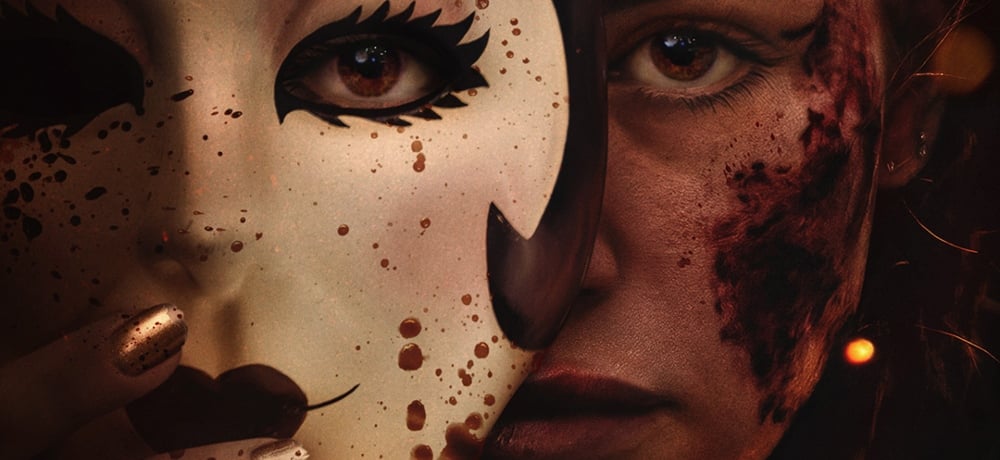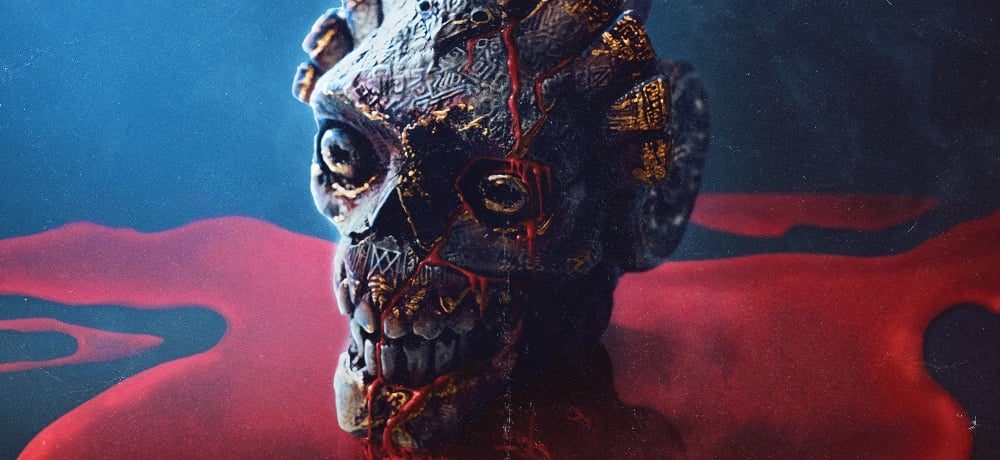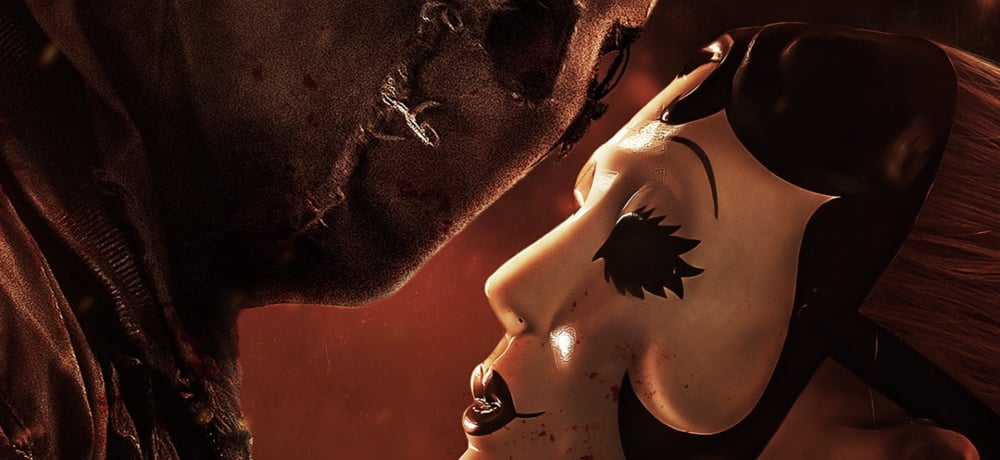





Arriving in theaters and on various VOD platforms this Friday is Terminal, the pulpy film noir and debut feature from writer/director Vaughn Stein, which boasts a thrilling ensemble that includes the likes of Margot Robbie, Mike Myers, and Simon Pegg. A twist on Alice in Wonderland that bobs and weaves through a series of interconnected stories, it's Robbie’s character Annie – an offbeat waitress at a greasy spoon diner called the “End of the Line Café” – that brings all of Stein’s story threads together for a truly unexpected reveal.
Daily Dead recently had the opportunity to speak with Stein, Robbie and Pegg at the recent press day for Terminal, where they discussed different influences on the look and the script for the film, their collaborative process working together, getting Myers on board for Terminal after he had stepped away from acting, and more.
Vaughn, let’s start off with you. How did you come up with this premise and the world of Terminal?
Vaughn Stein: It was sort of born out of three unhealthy obsessions of mine. I love film noir and I love the evolution of what it has branched out into over the years. And I love literature and just the idea of incorporating the aesthetics of the dark fairytale into this along with the sensationalized graphic novel palette.
The world sort of came first, really. I love the idea of creating this vast anonymous city and populating it with these noiresque inspired characters that were vibrant, funny and dangerous. And then, setting it all around this linchpin of this amazing woman who could do anything and be anything and pull anyone into her world. It all came from that really.
And how did you guys get to be involved?
Margot Robbie: The script was on my kitchen bench. I was living at the time with my producing partner, Josey McNamara, and she had known Vaughn for years through work. So, Vaughn's script was literally on my kitchen bench one morning, and that's where it began for me. I read it and I was like, “This is so weird. I love it. I love it so much. It's so dark and this dialogue scene is just going pages and pages and that never happens in a script.” And at the time, too, I really wanted to do a play. And I felt like I was reading a play. I just wanted to make it, and so, we did.
Vaughn Stein: Margot helped develop the script exponentially, and made it so much better. We really worked and honed it and brought in all these ideas that I'd never be brave enough to put in, in the first place.
Margot Robbie: I was asking Vaughn a lot of questions. I was like, “Why this and why that?” And every answer he gave, I was like, “Put that in the script. That is so amazing. Put it in the script.” So, the script started incorporating all these backstories and the world building that Vaughn was doing in his own head. It was really exciting, especially because Vaughn is a first-time filmmaker.
People need to take chance on directors, and if we don't all jump in together, and band together to do that, it's just not going to happen. So, we were like, “Let's do it. We're all friends. We all believe in it. Let's give it a go.” And then wonderful people like Simon came along, and put their faith in the project as well. And it is really a special thing to assemble the cast and the crew that ends up making a film. It was very much a little family, this one.
Simon, because you are a writer yourself, did you have any contributions to this script?
Simon Pegg: Well, one of the things that appealed to me about it when I first read it was the fact that it was dialogue heavy, it was character led, and as Margot said, it felt like a play. I really liked it and I like giving over myself to a director who has a specific vision. I think that's the job of an actor sometimes. You provide yourself to them as a tool which the can then use to create what they have written, or they're involved in collaborating. So, no, not really. We did a lot of rehearsal, and Margo and I would talk through scenes with Vaughn adjusting little bits here and there. Just through collaboration. Vaughn is very collaborative.
But one of the reasons I signed on was because I liked that this was a really interesting, strange idea. And Margot was attached, which meant that a: I got to work with Margot who I very much admire. And b: it also meant that it would probably get made as well (laughs). It's hard to make films, you know. But I really enjoyed this process.
In non-spoilery terms, what do you think it is about noir storytelling and the Alice in Wonderland stuff that you incorporated here that connects to who Anna is and to the story that you ultimately ended up telling?
Vaughn Stein: It's really interesting because classic noir has a lot of really feminist tropes. There are lots of really strong women in noir, and there are also lots of manipulatively criminal women in noir who use their wiles and use their charms, and are also intelligent and dynamic women. That's faded away after the height of the classic noir era, and it's something I really loved, and I really wanted this character of Annie to be at the center of the web. I wanted her to be able to utilize all the conventions and all the tropes of noir and what men wanted her to be to manipulate their fantasies.
Margot and I talked about a dressing up box in the corner of Annie's room where she could pull out the relevant costume in order to ensnare whatever this guy would respond to. Be it a kooky waitress, a femme fatal, a damsel in distress, a sexy stripper, whatever needed be. She could be all things to all men. And it was all in service of her purpose. It's her agency. They were very much Annie's decisions and Annie's actions that set the whole film in motion. It all centers around her and for me, I really wanted to write that character. I really wanted to make that role real. So, having someone as unbelievable as Margot in the role to elevate it far beyond anything I could ever write was a dream come true.
What influenced and inspired the look of Terminal? It really pops off the screen.
Vaughn Stein: We had an amazing, amazing cinematographer, Chris Ross who did just a stunning job. And Richard Bullock, the designer. They took this world and created a neon drenched noir for us. We have lots of touchstones, like Blade Runner of course, because I think is the very best one. It's a film that we all loved, and we really wanted to doff our cap to it.
Margot Robbie: We filmed before them (Blade Runner 2049) by the way. They used our locations (laughs).
Vaughn Stein: Yeah, we saw them walking around and we were all very excited. But the original was a big one for us. We also wanted this to have that sense of Britain to it as well. It was supposed to be reminiscent but not recognizable as proper Britain, so we borrowed quite heavily from 1984 in that way. The gin was called Victory Gin and there were lots of fun things like that that amused me.
We also looked at movies like Who Framed Roger Rabbit or Brazil, which was another big one. We wanted to look at different genres, and look at different styles of films, and utilize a collage of all of these different influences and genres to create something kind of unique and new. Basically, we just stole loads of shit (laughs).
Simon Pegg: I think, sometimes when you're working with the kind of budget we had, necessity is the mother of invention, and you have to think on your feet and think of solutions which are put on you by lack of resources. When you are making a big movie you can just like, “Whatever. We'll do it later. We'll do that later. We can throw money at that.”
With this kind of film, there's such a load of imagination and resourcefulness in the moment that some of the problem solving ends up giving the best solution you could ever have. You have to come up with something that is very immediate and very effective and honest and authentic. And I think that's this film all over because of the process.
What about Mike Myers? How the heck did you ever get him in this, and how was he to work with?
Margot Robbie: Yeah, it’s been seven years since he made a movie, and I don't think any of us truly believed we'd get him. It's kind of a crazy idea. We spoke a lot about finding a character actor for that role, someone who really utilizes their physicality in their characters and that's how the conversation eventually led to speaking about Mike Myers and where the hell is he these days. Would he do this? He spoke to Vaughn for like five hours, and then next minute, we get a call, saying, “He's in.” We were like, “Hallelujah!" It was incredible. Just incredible. I never thought I'd ever meet the guy, let alone get to work with him.
Vaughn Stein: And he's so precise, too. He is so good at creating these enduring characters. Of course, he's hilarious and of course he's got brilliant spontaneous wit, but he works so hard at his characterization and his physicality and his look. And he pours his heart into it, too. He elevated that character so far above my paltry words on the page. He really took it and ran with it. On that call that Margot was just discussing, he came up with an entire backstory. I could hear him rustling through these sheets of paper with all these notes that he had just made. It was just all this amazing information for him draw on to create that character that you saw. It was brilliant.